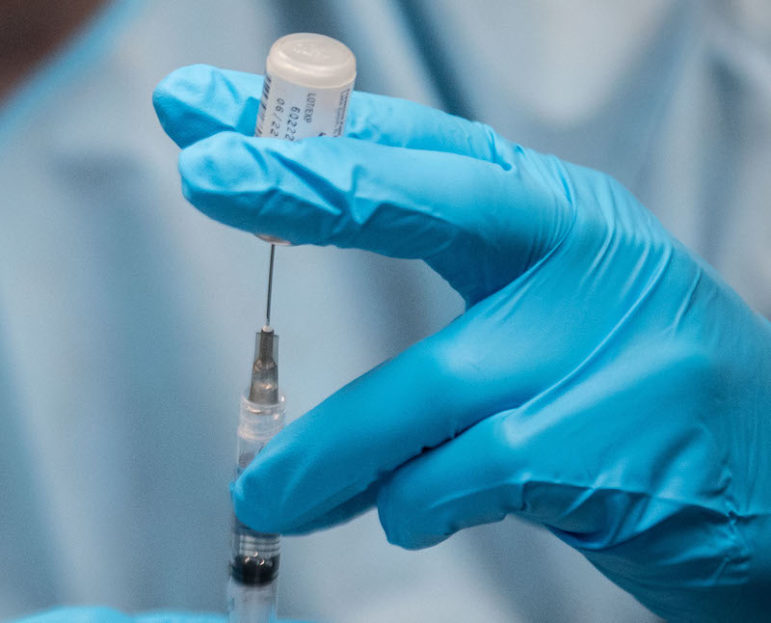Half of the detainees refused to receive the vaccine, with some complaining that they were not given any information about the shot they were offered.

Michael Appleton/Mayoral Photography Office
A shot of COVID-19 vaccine.This article originally appeared in Spanish.
Lea la versión en español aquí.
On Jan. 22, COVID-19 vaccination began at the Hudson County Department of Corrections & Rehabilitation where, as of Feb. 4, 27 of the 54 immigrants detained by Immigration and Customs Enforcement (ICE) there had refused to receive the shot.
“In my section, we are 25 [ICE detainees], and of those, six or seven didn’t get it,” says Mario, a detainee (City Limits is using a pseudonym to identify him). Mario refused the vaccination because he had been on a hunger strike last month, and feared he would feel weak, something he has seen some of the vaccinated detainees experience.
Fernando — also a pseudonym — was among the detainees who did get vaccinated at the New Jersey facility. He didn’t think much about it, he admits. As soon as the doctor passed in front of their cells asking who wanted to be vaccinated, Fernando said “I,” with no hesitation.
“I signed a document stating that I voluntarily was being vaccinated,” Fernando says. Then he received a card stipulating that in 28 days, he had to take a second dose of the vaccine.
Fernando’s right arm, where he was inoculated with the vaccine, was sore for two days. “It didn’t hurt at the time but I felt a pain in my arm days later.” Fernando has had no other pain, nor has he had the coronavirus.
Both Mario and Fernando say that on the vaccination day, the county jail doctor did not give information about the vaccine. “They didn’t inform me of anything. They just gave me a piece of paper [the vaccination card], with my ID number and my name. They didn’t even say what kind of vaccine it was,” says Fernando. The Moderna vaccine is what is being used there.
Ron Edwards, director of the Hudson County Department of Corrections & Rehabilitations, told City Limits that ICE detainees in the jail have been informed about the COVID-19 vaccine in three ways: posters in Spanish and Mandarin; talks given by medical personnel; and televisions broadcasting News 12 New Jersey.
According to Mario and Fernando, even correction officers at the jail have refused the vaccine. Edwards says he does not know how many of his COs have had it, and has no authority to require it. Edwards says his job is to offer the vaccine, as well as to make sure that medical protocols are followed.
Mario says that another reason he refused the vaccine is that he does not trust the prison system. He suggested that if he could get vaccinated at a state vaccination center, he would not be suspicious.
“That’s not possible,” Edwards responded about this vaccination proposal. “For 27 [ICE detainees who have refused the vaccine] it is absolutely illogical” to take them to an outside facility. He adds that having a 50 percent vaccination rate among ICE detainees is not bad, compared to other sectors.
According to Edwards, Tylenol was given to the ICE detainees who were vaccinated.
Access to the vaccine, says Andrea Sáenz, attorney-in-charge of the New York Immigrant Family Unity Project at Brooklyn Defender Services, “is a step in the right direction.” However, “many people have questions and concerns about vaccines, not just because it is new and uncertain, but also because of a long history of vaccine testing and medical experimentation on communities of color and other vulnerable people,” she said via email.
“As far as we understand,” Sáenz adds, “we do not believe that ICE or Hudson County Jail have provided adequate information to allow people to decide whether or not to take the vaccine.”
City Limits asked ICE about the specific situation at the Hudson jail, but the agency would only discuss the matter in general terms, stating that it is working with state and local health departments to ensure that the detainee population is included in state vaccination plans. The New Jersey Department of Health also declined to elaborate.
“We call on ICE and Hudson not only to provide comprehensive vaccine access but also to ensure people are able to make an informed choice that is best for them,” Sáenz says.
“Those of us who did not get vaccinated are being checked,” for COVID-19 symptoms, says Mario. Those who were vaccinated and those who were not remain in the same cells they previously occupied; they have not been separated.
The concerns about the vaccine are not the only ones facing detainees. Amid the big snowstorm last week, the jail went under a restricted schedule.
“People were locked up for 48 hours. Little food in the cell; couldn’t call, couldn’t bathe,” says Mario. Edwards denied that ICE detainees could not bathe.









